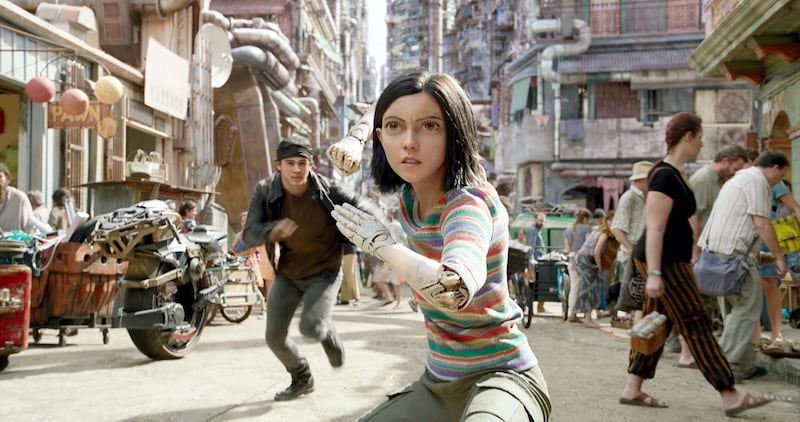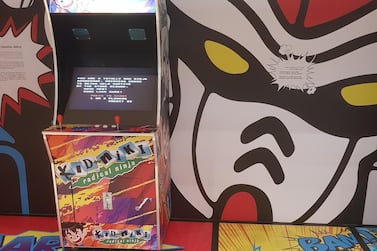Manga comics will get their very first mega-budget Hollywood blockbuster adaptation this month, when James Cameron and Robert Rodriguez's Alita: Battle Angel opens in cinemas across the UAE.
The manga fan base
Manga has always had a solid underground fan base in the West – right now the anime Dragon Ball Super: Broly sits at number three at the American box office, having taken $25 million (Dh91m) in less than a week since its release, and is also in cinemas across the UAE. The live-action adaptation of Ghost in the Shell, which released in 2017, saw Scarlett Johansson in a leading role, and hinted at growing Hollywood interest in the genre, though poor reviews and a slow box office dampened the hype around that film. Netflix is set to release a new version of it in 2020.
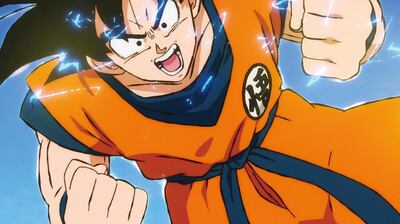
In the grander scheme of things, however, manga and anime have always been a minnow in the United States entertainment market. Not in its homeland, however. Manga is a huge business in Japan, with sales of print, digital books and comics worth $4 billion in 2016.
That total figure dwarfs the US's comparatively small $1bn comics market, where manga has never been more than a bit-player in the past. Japanese titles accounted for just $85m of that.
The appetite for Japanese animated films in the US is minimal, historically. Your Name, which released in 2017, is the highest-grossing anime to date, and took $358m globally, but only $5m of that was at the US box office, a figure that is smashed by takings in China, South Korea and, of course, Japan.
The numbers do suggest that things are turning for manga, however. Those $85m worth of comics may be a small corner of the market, but it represented a third consecutive year of growth.
Add to this the insane popularity of the Pokemon Go phenomenon, Dragon Ball Super: Broly in the US, the enduring popularity of J-Pop and the clear Japanese influence on films like Disney's Big Hero 6, and it does seem like Japanese culture could be setting off on something of a roll in the West. Could manga explode with Alita? The film boasts a budget of $200m, a cast including Christoph Waltz, Ed Skrein and Mahershala Ali, with Rodriguez on directing duty. Cameron writes and produces alongside his Titanic and Avatar producer James Landau, and it certainly looks to have a solid claim to be the first time Hollywood has dived into manga with the full-on blockbuster treatment.
What's the film all about?
Alita: Battle Angel reimagines a mythical post-apocalyptic world, where humans add cybernetic body parts as a matter of course, and the most advanced cyborgs are "total replacements", where only their brain remains and the rest of their body is as fast, strong or beautiful as they want it to be.
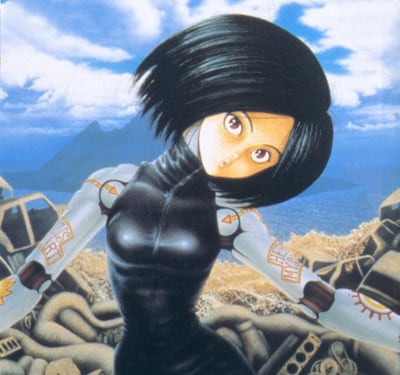
When Alita (Rosa Salazar) awakens in this dystopian future world with no memory of who she is, she is taken in by Ido Waltz, a compassionate cyber-physician in Iron City, who realises that somewhere in this abandoned cyborg core, is the heart of a young woman with an extraordinary past. Cameron has been working on Alita for two decades, since he first read Yukito Kishiro's graphic novel series Gunnm, on which the film is based, in 1999 and developed a taste for manga. He spent years developing the material as a directing project for himself, but when his focus turned towards developing the Avatar sequels, Cameron brought in Rodriguez.
Big-name backing
In the production notes from filming, Cameron admits he had reservations about handing over control of a project he had worked on for so long. "I thought: 'Am I really ready to give up my baby?' So, I said, if you can crack the code and you want to do it, let's do it," he says. Satisfied by Rodriguez's work on the shooting script, Cameron offered him the directing job, although he remained heavily involved as a writer and producer.
Rodriguez says what you see on the screen in Alita: Battle Angel is the result of many combined imaginations syncing up, but most of all it is meant to be Alita's vision of Iron City.
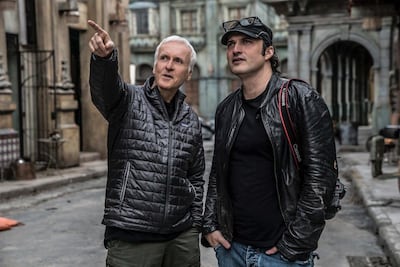
"You see this story through Alita's eyes, eyes that have an innocence to them and see the beauty in things," the director says in the notes. "We set out to create something that feels very tactile, that's immersive, that has unexpected moments, all the things you anticipate in a Jim Cameron movie. What's amazing is that Jim has been working on Alita since 1999, but even now, nobody has made anything like it. Making it finally happen has been an incredible process of collaboration."
Being more human
Kishiro, who wrote the original graphic novels, believes we’re already living in a prototype version of Alita’s world: “Even before the internet, we couldn’t live without electricity or technology, which makes us similar to cyborgs,” he says. “We just accept it and try to live our lives, as cyborgs do in Iron City. I think it only puts the emphasis on how can we be more human.”
While Cameron is renowned for his sweeping cinematic epics, including the top two highest-grossing films of all time, Avatar and Titanic, Rodriguez is better known as an indie director, making gritty actioners like Machete and Sin City and demonstrating an impressive ability to deliver his vision on a limited budget. This new film offers Rodriguez the opportunity to take that vision to a whole new level: "Tech has always been a big part of what I do," he explains. "But with this film, I knew I would have a chance to go exponentially further because Jim has already innovated so many different technologies for visualising, pre-visualising and making 3D films. I took it as a real chance to learn. I knew I'd be really challenged, which I thought was fantastic."
The meeting of these two legendary cinematic minds certainly promises an intriguing end product, and perhaps one that finally pushes manga outside the bedrooms of a small number of obsessed fans in the West and into the consciousness of mainstream audiences.
For Rodriguez, however, his main concern is that audiences leave theatres having developed a real emotional connection with Alita. "At the centre is always Alita's human journey," he says. "And that's also what Alita realises. She may have lost much of her memory, but she has found her humanity, which is what counts."
Alita: Battle Angel is in cinemas across the UAE from February 14
